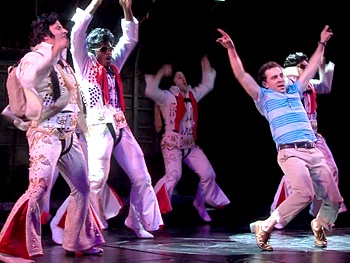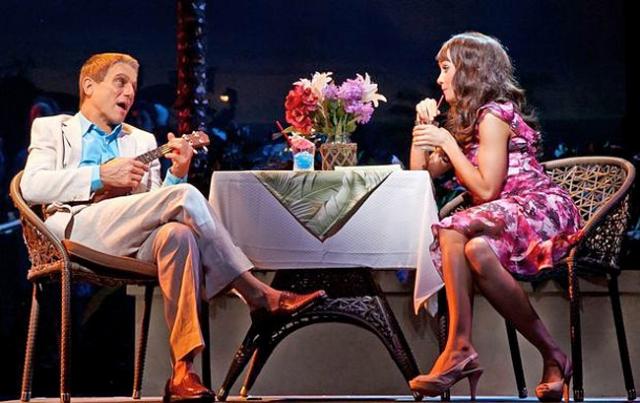


In Honeymoon in Vegas, once again, we have a heroine who desperately wants to get married (Guys and Dolls). Her screwed-up fiancé is in the clutches of his guilt-spewing mother (Bye Bye Birdie)who, it turns out, is long dead. Unfortunately, that doesn’t keep her from popping up in the most unlikely places, and the worst possible time, to remind sonny that she told him never to marry. Although she’s been disappointed many times, Betsy hangs in there, waiting for Jack to finally grow up and do the right thing. The question is…why?
As played by Brynn O’Malley, Betsy is a knock-out, with spunk and plenty of smarts. Rob McClure’s Jack is not just a liar, but also whiny, dim-witted, and thoroughly unattractive. It might work if there were chemistry between O’Malley and McClure. There isn’t. Fortunately, Nancy Opel is genuinely funny as Bea, Jack’s nightmare of a mother.
So, when the driving force of the play should be our fervent hope for Betsy and Jack to get together and be married, we don’t honestly care. And there’s that insistent little voice that keeps saying adorable Betsy could do a whole lot better than the self-proclaimed shmuck.
On a positive note, the show starts out really well. It’s a sheer delight to have an orchestra on the stage playing tuneful swing music. Things do pick up when the action moves to Vegas, where Jack has promised Betsy that this time, they will get married. It’s fun to see the showgirls in costume designer Brian Hemesath’s flamingo pink outfits, complete with feathered headdresses and sparkly stockings. The high kicks and splits are enough reason for out-of-town dads to endure an evening of theater. Best of all, into the Milano hotel walks a shady character named Tommy, and the audience breaks into thunderous applause for Tony Danza.
Interestingly, this is where the show really falls apart. Danza is a doll; he’s handsome, he’s dressed great, and doggone it, the man is just plain lovable. As it happens, Betsy is a ringer for Tommy’s dead and much lamented wife, Donna. Donna died of skin cancer, from way too much sun and no Coppertone. Tommy instantly devises a plan to get Betsy alone, with any luck, forever. And a funny thing happens. We start to feel that, gee, maybe Betsy would be better off with this rich, great looking guy who’s so obviously smitten. When Tommy lures Jack into a high-stakes poker game, and Jack ends up deep in the hole, Tommy proposes a way out. The debt will be forgiven if Jack agrees to let Tommy spend the weekend with Betsy. No funny business, you understand; just some time together. Jack reluctantly agrees, and the next thing we know, Betsy is being whisked off to Hawaii. Jack is in trouble, and when Act II begins, so are we. If it weren’t for the hysterical band of Flying Elvises and their silly laugh, paradise would turn pretty gray.
A word must be said here about the music. It’s not great. The tender ballad that’s sung by Betsy and Tommy, “You Made the Wait Worthwhile,” is lovely. But no audience should be subjected to “Friki-Friki.” That the only words which rhyme with friki are “licky” and “sticky” tells the tale. “Bali H’ai” it ain’t. What has happened to the Jason Robert Brown we love, the one who gave us the lyrical The Bridges of Madison County and the sharp wit of Parade? Can he imagine we’ll be enthralled by the abysmal “Every Day is Happy in Hawaii”? Director Gary Griffin must share the blame for the total energy drop of the second act. Most of it could and should have been cut. The plane descent of the Flying Elvises is a lost case from the beginning, but couldn’t something clever have been devised? Scenic designer Anna Louizos has done a capable job delineating the atmosphere of Brooklyn vs. Vegas vs. Hawaii, and the scene in front of Tommy’s hideaway is serene; we can almost smell the ocean.
Author Andrew Bergman should have taken a bold move away from the film. Why stick with an end to the story that made sense when the 1992 film starred Sarah Jessica Parker and the always weird yet somehow sensual Nicolas Cage as the engaged couple, and James Caan as the dangerous and sexy gangster? Bergman both wrote and directed the movie, but here, he had an opportunity to make a change more in keeping with the current climate. Rather than the unbelievable switch from sweet guy going to abusive lout, why not let Betsy and Tommy end up together? Or, if that’s not an option, show Betsy and us at the same time that Tommy is still hung up on Donna. He could insist on Betsy wearing Donna’s signature over-the-top hairdo, and even slip up and call Betsy “Donna” at the wrong moment. She’d still end up with Jack, but we’d have a better reason why.
The opportunity to see Tony Danza enchant the audience with his tap dancing, and to catch Brynn O’Malley in her first, but definitely not last, leading role on Broadway is almost worth the price of admission. Almost, but not quite.
